"The Testaments" (Nan A. Talese/Doubleday), by Margaret Atwood
Margaret Atwood wrote her much-anticipated sequel to "The Handmaid's Tale" in a number of places, like "the dome car of a train stuck on a siding due to a mudslide, on a couple of ships, in a number of hotel rooms, in the middle of a forest."
That seems appropriate given that "The Testaments," which begins 15 years after the "Handmaid's Tale" leaves off, is a wild ride, taking us beyond the walls of the fictional Gilead.
In theocratic Gilead, women are uneducated, illiterate and serve to procreate. This follow-up is a suspenseful page-turner, less bleak than its predecessor, with a nod to spy thrillers. Atwood's "Handmaid's Tale," published nearly 35 years ago, became even more of a cultural phenomenon when Hulu rolled out the 2017 adaptation, sending a new generation in search of a copy of "The Handmaid's Tale," perhaps from their mothers' shelves. The book became a feminist manifesto — required reading in high school and college classes — not only for many coming of age in the 1980s, but for future generations.
In real life in the last couple of years, red-cloaked women started showing up in government halls, protesting discrimination and challenges to reproductive rights, in the costume of the Handmaids, who were systematically raped in Gilead to give "Commanders" progeny.
The fate of Offred is uncertain at the end of "The Handmaid's Tale." And that main character, while mentioned in "The Testaments," is not one of the three women giving testimony, but her actions propel the plot of "The Testaments."
Beginning with the chilling Aunt Lydia, who is writing an account dubbed "The Ardua Hall Holograph," the reader is brought back into the world of Gilead, which seems to be starting to crack. "Over the years I've buried a log of bones; now I'm inclined to dig them up again — if only for your edification, my unknown reader," Aunt Lydia writes.
The other testimonies come from two girls: Agnes, who grew up in Gilead, and Daisy, who was reared in Toronto. But it is Aunt Lydia who steals the show, and allows Atwood to drop some jokes. Agnes meets in the Schlafly Cafe as she plays other aunts against each other and tells a Commander that at Ardua Hall, a sort of nunnery, they say "Pen is Envy."
In "Testaments," we learn about the origins of Aunt Lydia, who is immortalized as a statue at Ardua Hall while she is still living, one of the most vicious characters of "The Handmaid's Tale." Too old to make babies, she became an "Aunt," charged with instructing and disciplining girls. Lydia recounts how she was beaten three times after the world started falling apart. "Three is a magic number," she says, adding she has a third eye that was "cold, like a stone; It did not weep: it saw." The structure of the three testimonies of the three characters works well in this book, propelling the story and the fate of Gilead.
Agnes, horrified at being married to a ruthless Commander, balks and Lydia takes her under her wing. Daisy, who lives a relatively normal life as a teen in Toronto (where she protests and writes school essays about Gilead), is forced from her home and must confront the reality of the misogynistic Gilead and her past.
"We must all bear the afflictions that are sent to test us," one of the Marthas (women who serve as housekeepers) tells Agnes.
And these three characters are tested. And we are treated to a book that satisfies many of the questions left hanging at the end of "The Handmaid's Tale" by a writer who seems to enjoy this ride.
SEOUL, South Korea (AP) — The United States and its allies are discussing options “both inside and outside the U.N. system” to create a new mechanism for monitoring North Korea over its nuclear weapons program, the American ambassador to the United Nations said Wednesday.
Russia last month vetoed a U.N. resolution in a move that effectively abolished monitoring by U.N. experts of Security Council sanctions against North Korea, which prompted Western accusations that Moscow was acting to shield its arms purchases from North Korea to fuel its war in Ukraine.
“I look forward to engaging with both the Republic of Korea and Japan, but like-minded (countries) as well, on trying to develop options both inside the U.N. as well as outside the U.N. The point here is that we cannot allow the work that the panel of experts were doing to lapse,” U.S. Ambassador Linda Thomas-Greenfield told a news conference in Seoul, using the formal name for South Korea.
Thomas-Greenfield didn’t provide specific details about U.S. discussions with allies and other partners, including whether an alternative monitoring regime would more likely be established through the U.N. General Assembly or with an independent entity outside of the U.N.
Thomas-Greenfield met with South Korean Foreign Minister Cho Tae-yul on Monday and they discussed unspecified “next steps to ensure a continuation of independent and accurate reporting” of North Korea’s illicit weapons development activities, according to her office.
Thomas-Greenfield said it was clear that Russia and China, which abstained from voting on the U.N. resolution vetoed by Moscow, will continue to try to block international efforts to maintain monitoring of U.N. sanctions against North Korea. She criticized Russia for violating those sanctions with its alleged arms purchases from North Korea, and China for protecting the North from being held accountable.
Moscow and Beijing have thwarted U.S.-led efforts to tighten U.N. sanctions on North Korea over its ramped-up ballistic missile testing since 2022, underscoring a divide between permanent Security Council members that deepened over Russia’s war on Ukraine.
“I don’t expect that they will cooperate or agree with any efforts that we make to find another path, but that is not going to stop us from finding that path moving forward,” Thomas-Greenfield said.
Thomas-Greenfield also briefly addressed questions about tensions in the Middle East. When asked about the Palestinian Authority's request to have full U.N. membership, she said a U.N resolution in support of that request would not contribute to finding a two-state solution to the Israeli-Palestinian conflict.
“President Biden has said categorically that we support a two-state solution for addressing the situation in the Middle East, where Palestinians will have a state of their own and Israel is secure in their state, and we are working on the ground to get to that place as quickly as possible,” she said.
“We do not see that doing a resolution in the Security Council will necessarily get us to a place where we can find a ... two-state solution moving forward," she added.
Tensions on the Korean Peninsula are at their highest point in years, as North Korean leader Kim Jong Un has accelerated his weapons demonstrations and issued provocative threats of nuclear conflict against rivals.
The United States, South Korea and Japan have responded by expanding their combined military exercises and sharpening their nuclear deterrence strategies built around strategic U.S. assets.
In a telephone conversation on Wednesday, South Korean President Yoon Suk Yeol and Japanese Prime Minister Fumio Kishida agreed to further strengthen three-way cooperation with Washington to counter North Korean threats and other regional challenges amid “deepening uncertainties in the international situation,” Yoon’s office said.
The Security Council imposed sanctions after North Korea’s first nuclear test explosion in 2006 and tightened them over the years in a total of 10 resolutions seeking — so far unsuccessfully — to cut funds and curb its nuclear and missile programs. The last sanctions resolution was adopted by the council in December 2017.
The Security Council established a committee to monitor sanctions, and the mandate for its panel of experts to investigate violations had been renewed for 14 years until last month.
Russia’s U.N. Ambassador Vassily Nebenzia told the Security Council before last month’s vote that Western nations are trying to “strangle” North Korea and that sanctions are losing their “relevance” in preventing the proliferation of nuclear weapons in the North.
In its most recent report circulated last month, the panel of experts said it is investigating 58 suspected North Korean cyberattacks between 2017 and 2023 valued at approximately $3 billion, with the money reportedly being used to help fund its weapons development.
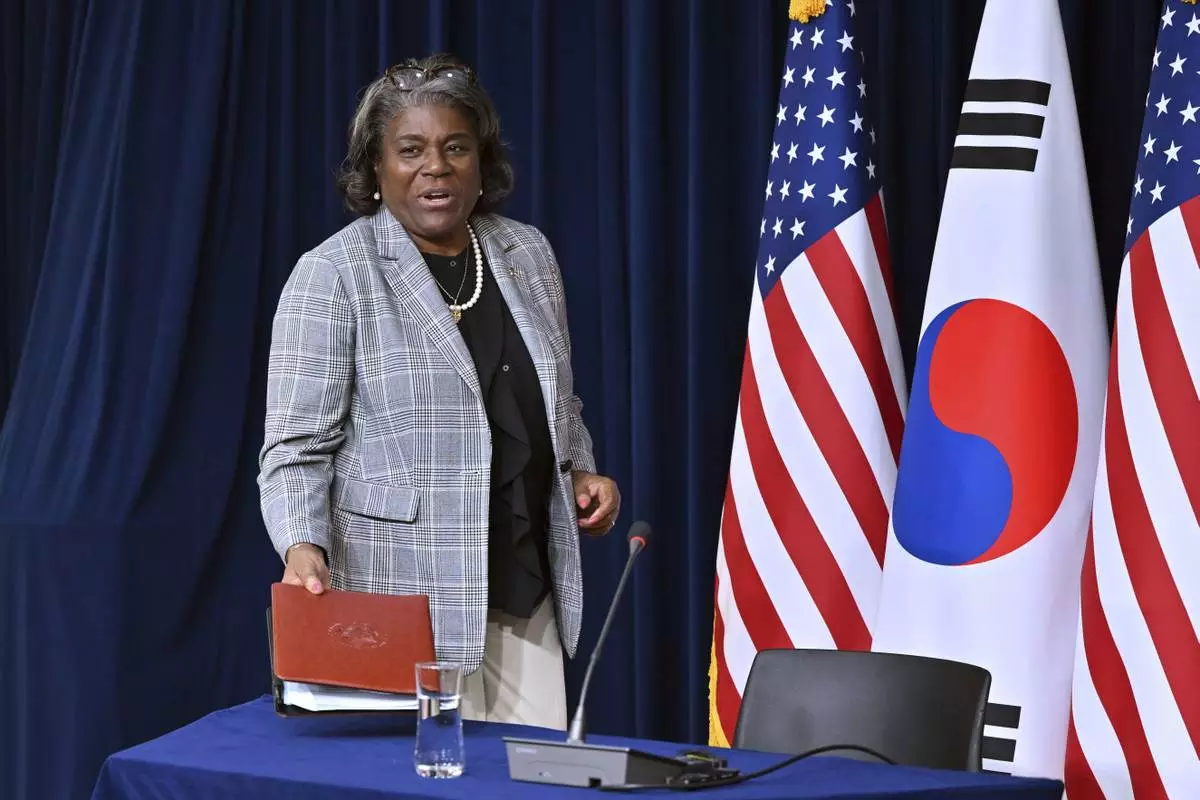
U.S. Ambassador to the United Nations Linda Thomas-Greenfield arrives to attend a press conference at the American Diplomacy House in Seoul Wednesday, April 17, 2024. (Jung Yeon-je/Pool Photo via AP)
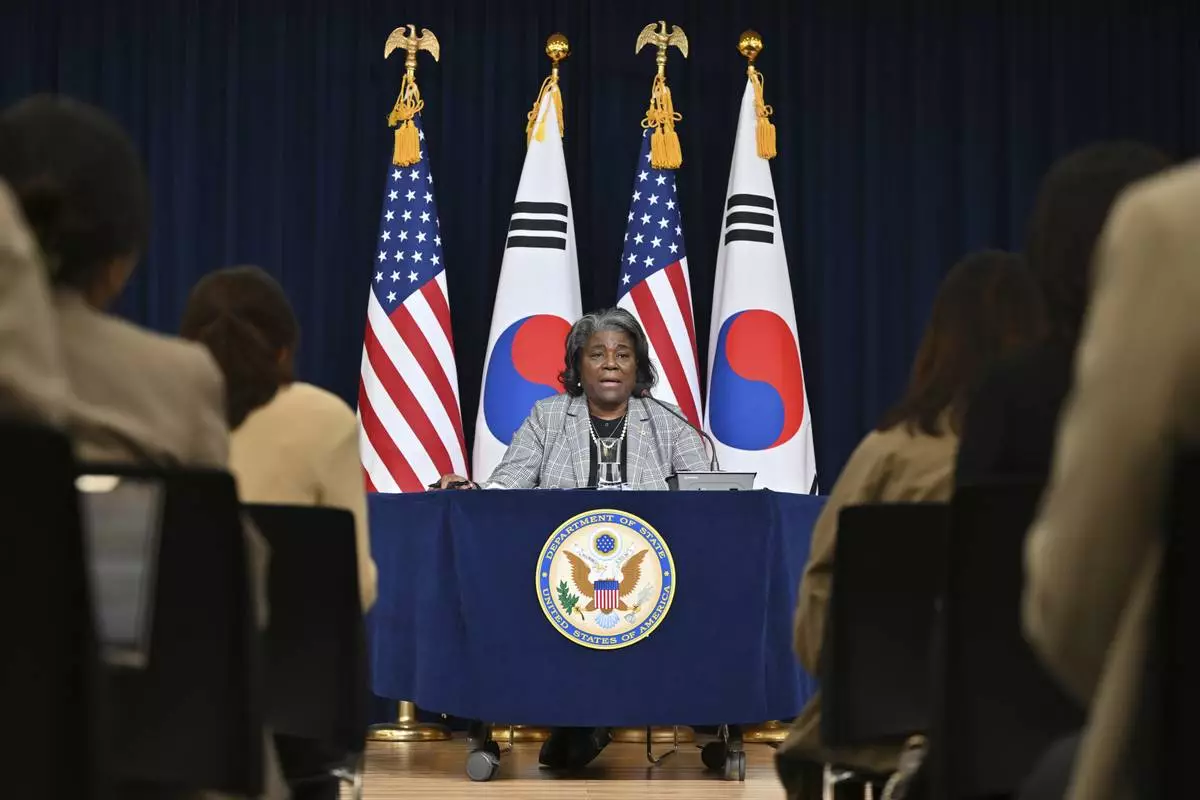
U.S. Ambassador to the United Nations Linda Thomas-Greenfield speaks during a press conference at the American Diplomacy House in Seoul Wednesday, April 17, 2024. (Jung Yeon-je/Pool Photo via AP)
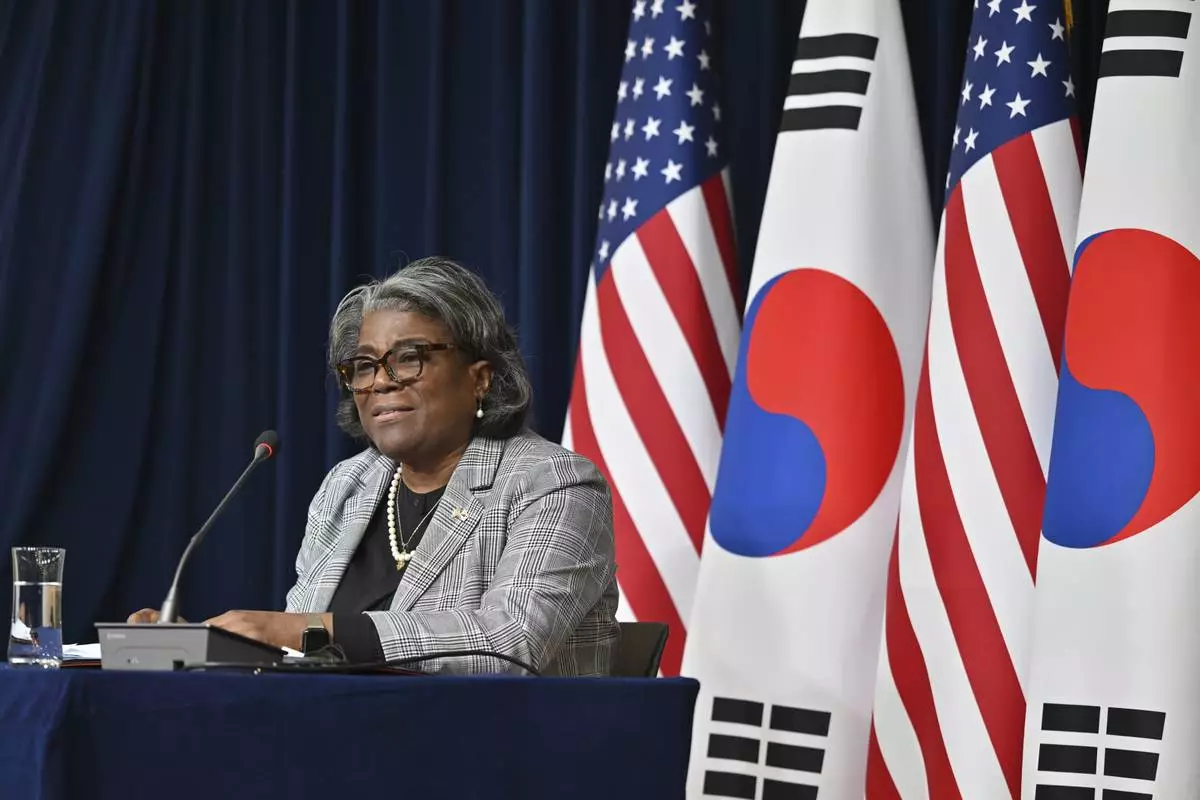
U.S. Ambassador to the United Nations Linda Thomas-Greenfield speaks during a press conference at the American Diplomacy House in Seoul Wednesday, April 17, 2024. (Jung Yeon-je/Pool Photo via AP)
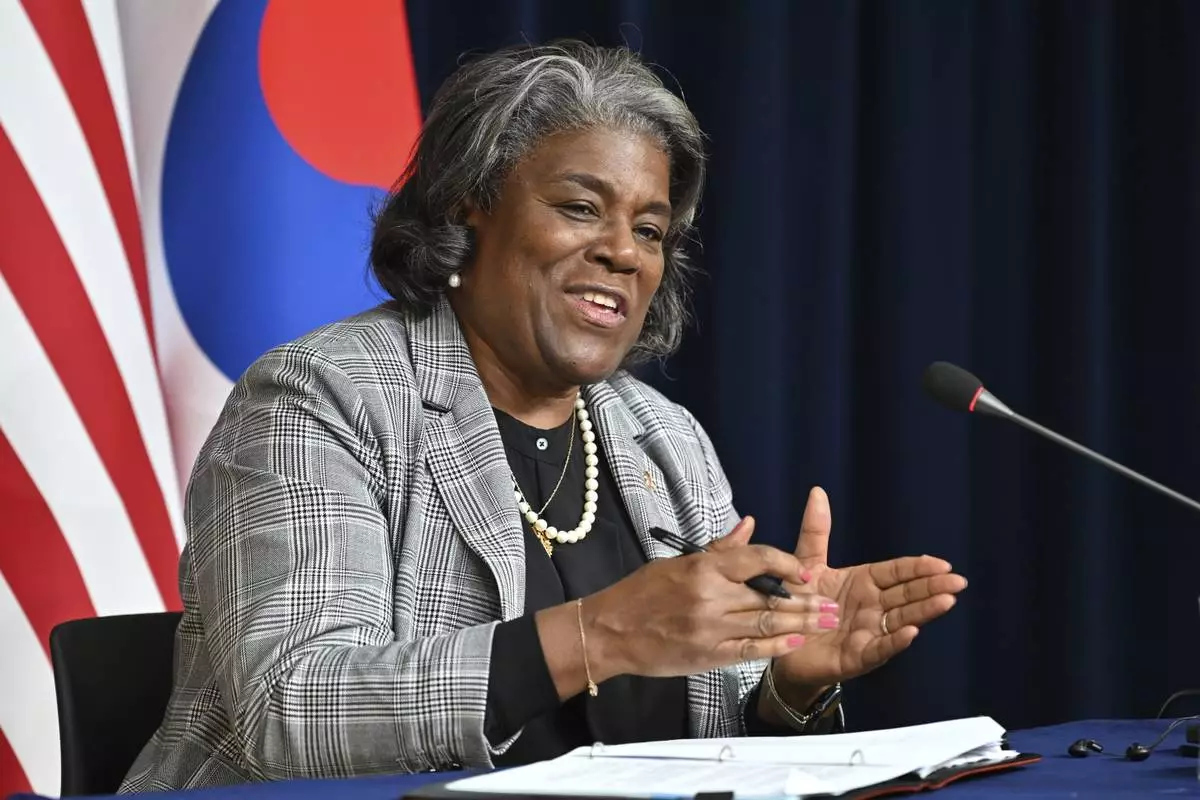
U.S. Ambassador to the United Nations Linda Thomas-Greenfield speaks during a press conference at the American Diplomacy House in Seoul Wednesday, April 17, 2024. (Jung Yeon-je/Pool Photo via AP)
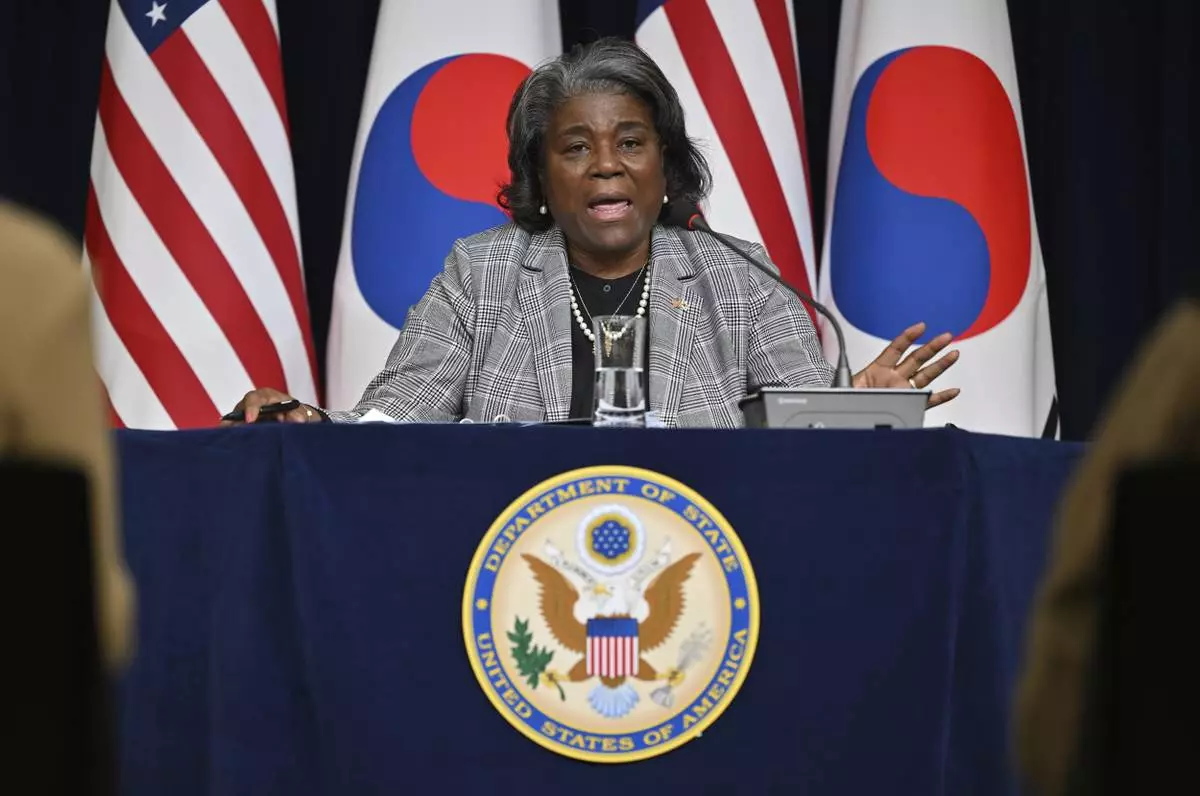
U.S. Ambassador to the United Nations Linda Thomas-Greenfield speaks during a press conference at the American Diplomacy House in Seoul Wednesday, April 17, 2024. (Jung Yeon-je/Pool Photo via AP)
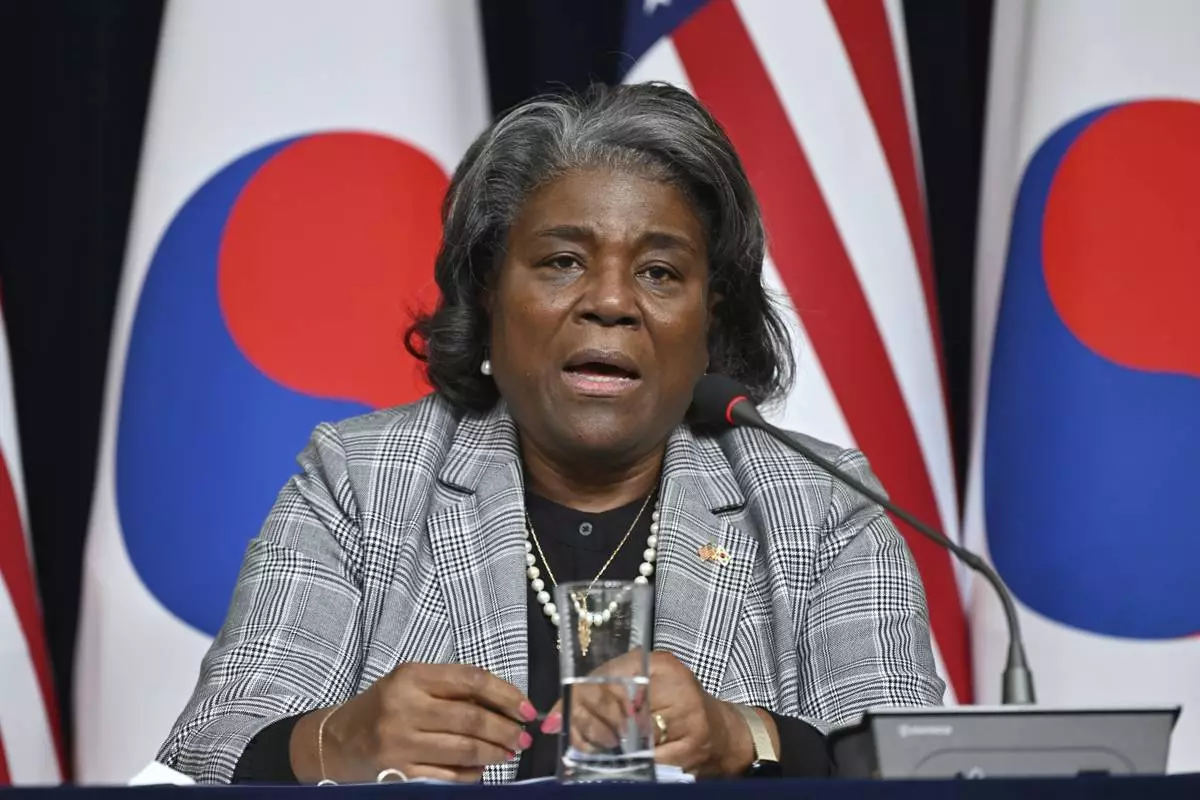
U.S. Ambassador to the United Nations Linda Thomas-Greenfield speaks during a press conference at the American Diplomacy House in Seoul Wednesday, April 17, 2024. (Jung Yeon-je/Pool Photo via AP)















